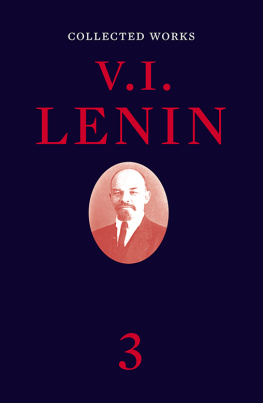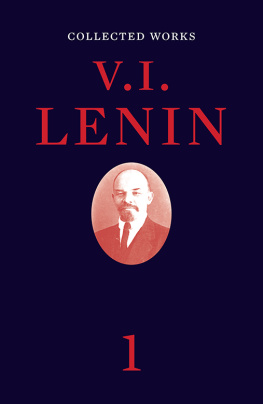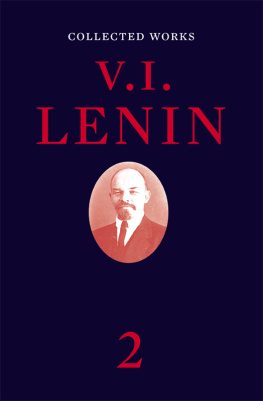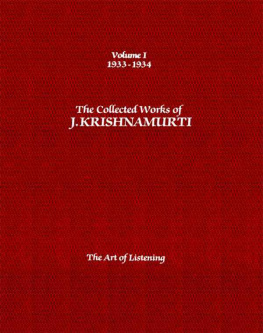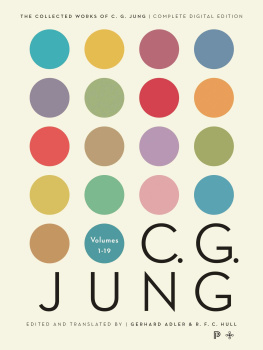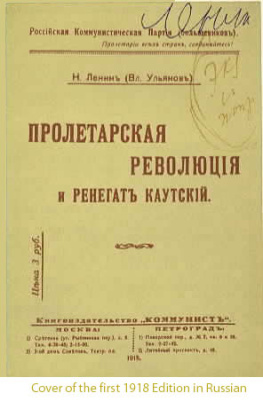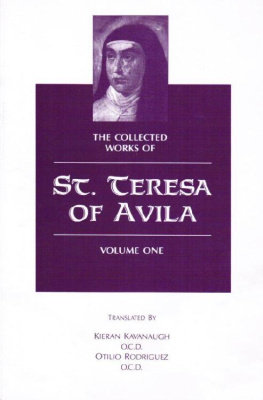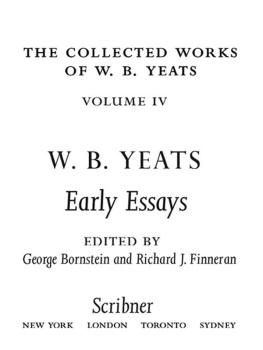V. I. Lenin - Collected Works, Volume 3
Here you can read online V. I. Lenin - Collected Works, Volume 3 full text of the book (entire story) in english for free. Download pdf and epub, get meaning, cover and reviews about this ebook. year: 0, publisher: Verso Books, genre: Romance novel. Description of the work, (preface) as well as reviews are available. Best literature library LitArk.com created for fans of good reading and offers a wide selection of genres:
Romance novel
Science fiction
Adventure
Detective
Science
History
Home and family
Prose
Art
Politics
Computer
Non-fiction
Religion
Business
Children
Humor
Choose a favorite category and find really read worthwhile books. Enjoy immersion in the world of imagination, feel the emotions of the characters or learn something new for yourself, make an fascinating discovery.
- Book:Collected Works, Volume 3
- Author:
- Publisher:Verso Books
- Genre:
- Year:0
- Rating:5 / 5
- Favourites:Add to favourites
- Your mark:
- 100
- 1
- 2
- 3
- 4
- 5
Collected Works, Volume 3: summary, description and annotation
We offer to read an annotation, description, summary or preface (depends on what the author of the book "Collected Works, Volume 3" wrote himself). If you haven't found the necessary information about the book — write in the comments, we will try to find it.
Collected Works, Volume 3 — read online for free the complete book (whole text) full work
Below is the text of the book, divided by pages. System saving the place of the last page read, allows you to conveniently read the book "Collected Works, Volume 3" online for free, without having to search again every time where you left off. Put a bookmark, and you can go to the page where you finished reading at any time.
Font size:
Interval:
Bookmark:

WORKERS OF ALL COUNTRIES, UNITE!
LENIN
COLLECTED WORKS
THE RUSSIAN EDITION WAS PRINTED |
COLLECTED WORKS
VOLUME
THE DEVELOPMENT
OF CAPITALISM IN RUSSIA
PROGRESS PUBLISHERS
MOSCOW
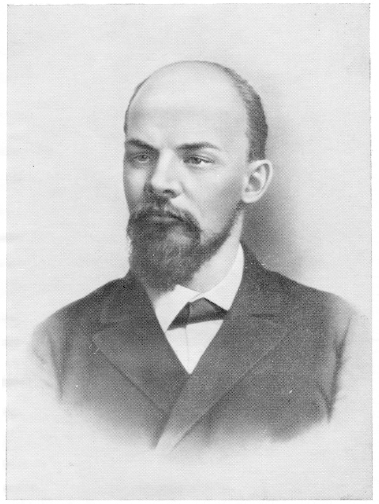
V. I. LENIN
1897
The typeset files we have used in these editions were created by David J. Romagnolo and are taken from www.marx2mao.com. They represent years of work, meticulously re-creating a stunningly high resolution, re-type-set digital archive of Lenins Collected Works and the PDFs are free to download. Verso gratefully acknowledges the invaluable work of Mr Romagnolo, who has kindly granted permission to reproduce his typesetting in the volumes of this series.
This English edition of V. I. Lenins Collected Works is a translation of the fourth, enlarged Russian edition prepared by the Institute of Marxism-Leninism, Central Committee of the C.P.S.U.
Corrections have been made to some of the texts and notes in accordance with the fifth Russian edition, and some further editorial comments have been added.
This paperback edition first published by Verso 2019
First published in English by Progress Publishers 1960
Verso 2019
All rights reserved
The moral rights of the author have been asserted
1 3 5 7 9 10 8 6 4 2
Verso
UK: 6 Meard Street, London W1F 0EG
US: 20 Jay Street, Suite 1010, Brooklyn, NY 11201
versobooks.com
Verso is the imprint of New Left Books
ISBN-13: 978-1-788732-598
ISBN-13: 978-1-788732-604 (UK EBK)
ISBN-13: 978-1-788732-611 (US EBK)
British Library Cataloguing in Publication Data
A catalogue record for this book is available from the British Library
Library of Congress Cataloging-in-Publication Data
A catalog record for this book is available from the Library of Congress
Printed in the United States
The increase in the number of industries 37-38.The creation of a home market as a result of the social division of labour 38.The manifestation of this process in agriculture 38-39.The views of the Narodnik economists 39.
The necessary connection between this phenomenon and the very nature of commodity and capitalist economy 40-41.
The mistaken view of the Narodniks 41.The view of the author of Capital on this subject 42.
The substance of the theory of Messrs. V. V. and N.on: its erroneous character 43-45.The foreign market is wrongly dragged into the problem of realisation 46.The superficial estimation of the contradictions of capitalism by the writers mentioned 47.
Adam Smiths omission of constant capital 47-49.The influence of this error on the theory of the national revenue 49-51.
The basic premises of Marxs theory 51-52.The realisation of the product under simple reproduction 52-53.The main conclusion from Marxs theory of realisation 54-55.The significance of productive consumption 55-56.The contradiction between the urge towards the unlimited growth of production and the limited character of consumption 56-58.
Proudhon 59-60.Rodbertus 60-62.Contemporary econmists 62.Marx 63-64.
The causes of the need for a foreign market 64-66.The foreign market and the progressive character of capitalism 66-67.
Rsum of the propositions examined above 67-68.The essence of the problem of the home market 69.
Economic groups of the peasantry 70-71.Commercial agriculture and the purchase and sale of labour-power 72.The top group; the concentration of land 72-73, and of animals and implements 73, the higher productivity of labour 74-75.Mr. V. V.s argument of the decline in horse-ownership 75.The hiring of farm workers and Mr. V. V.s argument on this phenomenon 76-77.The bottom group of the peasantry; the leasing of land 77-78.The middle group, its instability 79-80.Messrs. V. V. and Karyshev on peasant rentings 80-84.The attitude of the Narodniks to Mr. Postnikovs researches 84-85.
Data concerning the farms of the different peasant groups in Novouzensk Uyezd 85-87.The land held and the land in use by the different groups 87-88.Mr. Karyshev on land renting and grain prices 88-90.Wage-labour; the creation of a home market by the differentiation of the peasantry 90-92.The rural proletariat in Samara Gubernia 92-93.
Data concerning the farms of the different groups 93-94.The hiring of farm workers 94-95.Industries in Zemstvo statistics 95-96.Rentings 96-97.The arguments on land renting advanced by Messrs. Karyshev, N.-on, and Maress 97-101.A comparison of Kamyshin and other uyezds 101-102.The significance of the classification of peasant households 102-105.
Data concerning the farms of the different groups 106-107.The hiring of farm workers and day labourers and its significance 108-110.The manuring of the soil 110.Improved implements 110-111.Commercial and industrial establishments 111-112.
Data concerning the farms of the different groups 112-113.Incompleteness of the picture of differentiation from the data for Orel Gubernia 113-115.
Methods of classification in Voronezh abstracts 115-116.Data for Zadonsk Uyezd 116-117.Industries 117-118.
Data concerning groups of farms for three uyezds 119-122.
Novgorod Gubernia, Demyansk Uyezd 122-123.Chernigov Gubernia, Kozeletsk Uyezd 123.Yenisei Gubernia 124.Poltava Gubernia, three uyezds 125.Kaluga Gubernia 126.Tver Gubernia 126-127.
Methods of marking the summary 127-129.Combined table and chart 130-133 and 140-141.Examination of the various columns of the chart 134-139.Comparison between different localities as to the degree of differentiation 140-141.
Zemstvo Statistics for 112 uyezds of 21 gubernias 141-143.Army-horse census returns for 49 gubernias of European Russia 143-144.Significance of these data 144-145.
Data for 48 gubernias of European Russia 146-147.Statistical exercises of Messrs. Vikhlyayev and Chernenkov 147-148.
Character of the data and methods of treating them 148-150.(A). General results of the budgets 150-157.Magnitude of expenditures and incomes 150.Components of expenditures 151.Components of incomes 152-153Cash portions of the budgets 154-155.The significance of the taxes 155-156.(B). A characterisation of peasant farming 157-162.General data about the farms157-158.Property and implements 159.Farm expenditure 160-161.Income from agriculture 161.An apparent exception 161-162.(C). A characterisation of the standard of living 162-172.Expenditure on food in kind 162-163.Expenditure on food in cash 163-164.Remaining expenditures on personal consumption 165.Cash expenditure on personal and productive consumption 165-166.Mr. N.-on about the top stratum of the peasantry 166-167.A comparison between the standard of living or rural workers and peasants 167-169.Methods of Mr. Shcherbina 170-172.
The significance of commodity economy 172.1) Capitalist contradictions within the village community 172-173.2) Depeasantising 173-174.3) Characterisation of this process in Capital 173-176.4) The peasant bourgeoisie 176-177.5) The rural proletariat. The European type of allotment-holding rural worker 177-1806) The middle peasantry 181.7) The formation of a home market for capitalism 181.8) Increasing differentiation; significance of migration 182-183.9) Merchants and usurers capital. The presentation of the problem in theory. The connection between these forms of capital and industrial capital 183-186.10) Labour-service and its influence on the differentiation of the peasantry 186-187.
Font size:
Interval:
Bookmark:
Similar books «Collected Works, Volume 3»
Look at similar books to Collected Works, Volume 3. We have selected literature similar in name and meaning in the hope of providing readers with more options to find new, interesting, not yet read works.
Discussion, reviews of the book Collected Works, Volume 3 and just readers' own opinions. Leave your comments, write what you think about the work, its meaning or the main characters. Specify what exactly you liked and what you didn't like, and why you think so.

